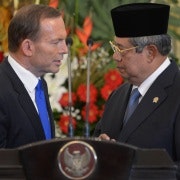Warburton's 'open mind' on the RET
The head of the Abbott government’s new renewable target review says he is going into the inquiry with “a very open mind”, despite his scepticism about humans' contribution to global warming.
Former Reserve Bank board member and business leader Dick Warburton told The Conversation that while people probably knew his position on global warming, they should not assume he had a pre-determined plan to undermine the renewable energy scheme.
In 2011, Mr Warburton co-wrote an article The Intelligent Voter’s Guide to Global Warming, criticising “the groupthink of climate scientists”.
“But I’ll be going in [to the Renewable Energy Target review] with a very open mind on the outcome because there are a lot of issues other than global warming,” Mr Warburton said on Monday afternoon. “There are economic issues and financial obligations already there.”
The new renewables review, due under existing law, will consider the contribution of the target to reducing emissions and its impact on electricity prices and energy markets, as well as the costs and benefits for the renewable energy sector, the manufacturing sector and Australian households.
Announcing the review, Industry Minister Ian Macfarlane said it would be “extensive. It won’t be a desktop audit.”
The target at present is for 20 per cent of Australia’s electricity to come from renewable energy, such as wind, hydro and solar power, by 2020.
There have been calls from within the government and from industry – particularly large energy and manufacturing companies – to water down or scrap that target to reduce power costs.
The last review of the RET was completed in December 2012 by the federal government’s Climate Change Authority. It concluded that the government should retain the current RET, and that scrapping it would save an average household only $15 a year.
The new review will be finished by the middle of this year and feed into the government’s energy white paper.
The announcement of the review came after United States Secretary of State John Kerry declared on Sunday that:
Rethinking Australia’s energy mix
In Canberra on Monday, the industry minister said that Australia’s diversity of energy sources was one of our greatest national strengths. “Renewable energy has contributed to the energy mix, but we must ensure that the program is operating effectively,” Macfarlane said.
Outlining the review’s scope, Environment Minister Greg Hunt said: “Our goals are very simple: to maintain investment certainty, to review progress and to ensure we can take the pressure off electricity prices.”
The government was “committed to easing the pressure of electricity prices for families and business. That’s why we’re getting rid of the carbon tax.”
The head of the review panel, Warburton, came under fire after his appointment was announced because of his previously expressed view that “the science is not settled” on the cause of climate change.
Asked about it on Monday, Mr Warburton said he firmly believed there was climate change going on “but there are many issues and things that can cause climate change”.
“As far as global warming is concerned, I’m not a denier but I am a sceptic about whether man-made carbon dioxide is a principal cause of global warming”.
The other members of the review panel are Matthew Zema, the chief executive of the Australian Energy Market Operator; Brian Fisher, managing director of BAEconomics and a former senior federal bureaucrat; and Shirley In’t Veld, a CSIRO board member and a former energy company chief executive.
Michelle Grattan is a professorial fellow at the University of Canberra.
Michelle Grattan does not work for, consult to, own shares in or receive funding from any company or organisation that would benefit from this article, and has no relevant affiliations.
This is an edited extract of an article that was originally published on The Conversation. Read the original article here.
















